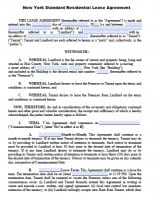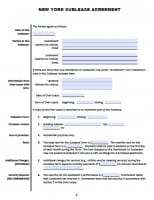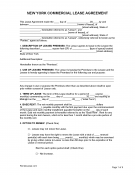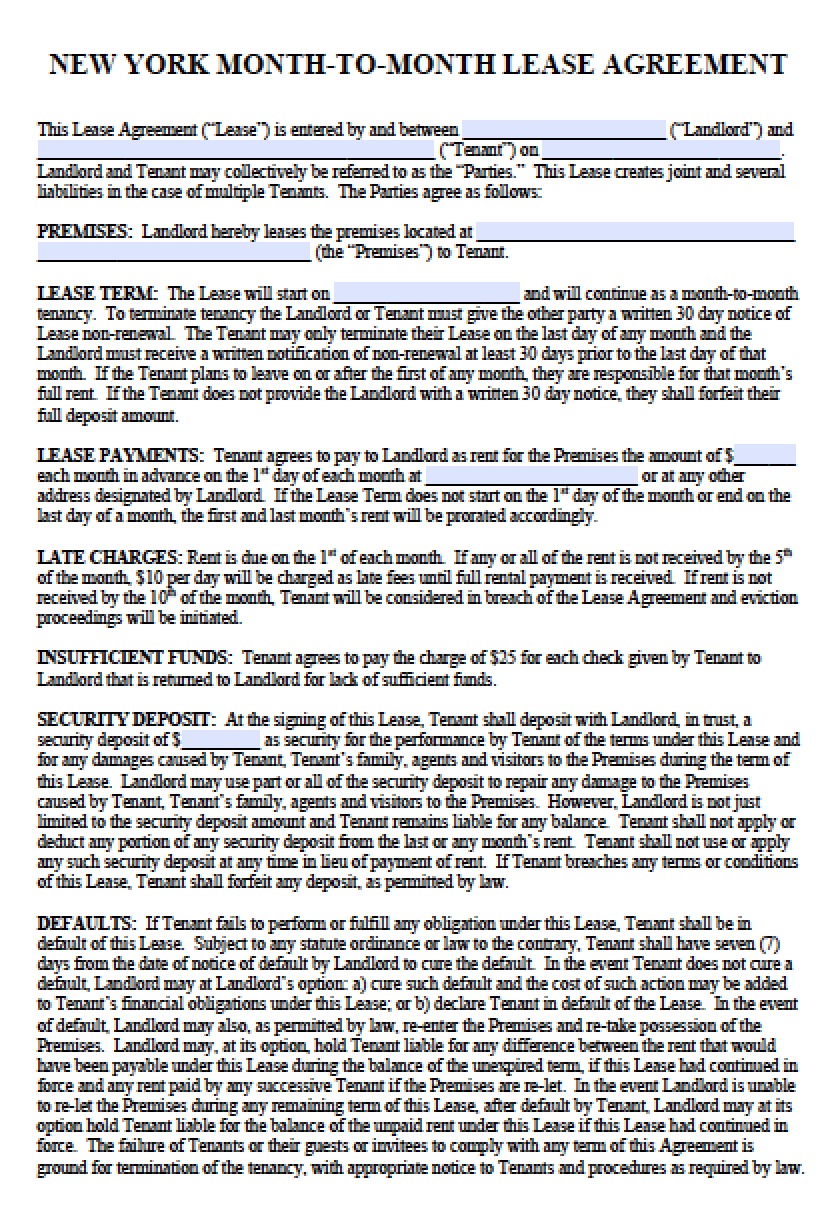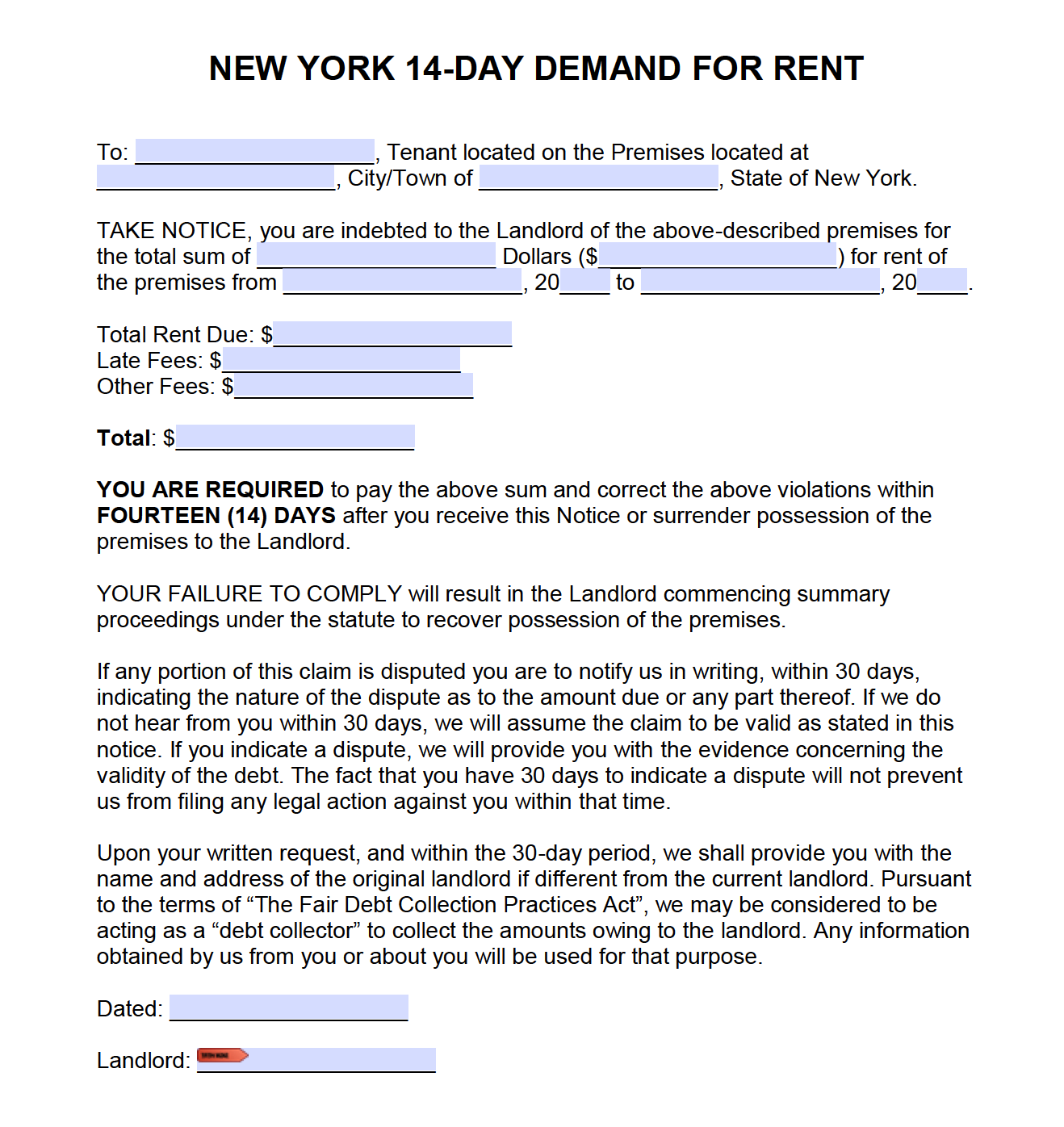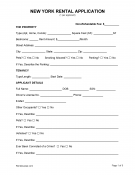The New York lease agreements are written after a lessor (landlord) and lessee (tenant) verbally agree to all the terms of a rental contract including the monthly payment amount and whether the tenant will be responsible for paying the utilities. The landlord, although not mandatory, should require the tenant(s) to supply their income tax filing information for the previous year in order to determine their monthly income and to see if they can afford the monthly payment. Most landlords will check to ensure that the applicant has access to at least one-third of their net income to ensure that they can cover the cost of rent. Once both parties sign the agreement, it is considered a legal and binding document.
New York Rental Lease Agreement Templates | PDF
New York Lease Agreements
The New York standard residential lease agreement allows an owner or landlord of the property to legally rent livable space to someone else. The tenant will be required to pay rent and take responsibility for a portion or all of the utilities, a condition to be determined during the negotiations between both parties. Once the landlord and tenant sign the agreement, it becomes final thus legally binding. The Tenants’ Rights Guide may be referenced for additional information about landlord-tenant laws….
The New York sublease and roommate agreements are very popular within the city and among university students as they allow a person who already has a lease with a landlord to rent the same space to another individual. There are two (2) ways to set up this type of contract: a standard sublease agreement where a sublessee takes over an entire space, and a roommate agreement where the tenant seeks another person to rent a portion of the space. In…
A New York commercial lease agreement establishes a landlord-tenant relationship that involves the use of rental space by an individual or entity operating in a commercial capacity. When selecting a lessee, the landlord’s first objective is to determine if the applicant would be a suitable tenant. The landlord will usually ask the individual or entity to fill out a rental application to obtain their current income profile, past income and corporate tax filings, and references (previous landlords). The landlord should…
The New York month-to-month lease agreement is a rental contract for residential real estate that allows a tenant to occupy space for an unstated period of time. The agreement will continue perpetually until the lessor or lessee gives notice to the other to terminate. Even though the lease can be considered a short-term arrangement, it must follow all State laws, and the landlord will have the same legal and financial exposure as a standard lease agreement. Therefore, the landlord is recommended…
The New York fourteen (14) day notice to quit for the nonpayment of rent is a letter that informs a tenant that they must either pay an overdue amount or vacate within fourteen (14) days. New York landlords are advised to use the online system to start the process (Inside New York City | Outside New York City) which gives them access to the most up-to-date forms for filing and serving the tenant. Once the notice has been created, it…
The New York rental application may be used by any landlord after a tenant has shown interest in a property. The application serves as a background check to investigate the prospective tenant’s personal information, credit history, current finances, and references (previous landlord and guarantor). If the landlord desires, they may charge a non-refundable fee for processing the tenant’s application. Once the tenant is approved, a lease should be drawn and a security deposit may be collected. Application Fee – The landlord…
STATE DISCLOSURES
Bedbug Disclosure – Required to inform the tenant(s) of any infestation (New York City only).
Lead-Based Paint – Required if the housing unit was built prior to 1978.
Move-in Checklist – Not required but recommended for any tenant that puts up a security deposit at the time of the lease signing.
Real Estate Disclosure – Only required if the property was presented to the tenant through a real estate agent.
Windows Guards – Required to be handed out to tenants who live with a child age ten (10) or younger (New York City only).
Security Deposit (§ 7-103(2-a)) – If a security deposit is held by a landlord in a banking institution, the landlord must disclose in writing the name and address of the bank as well as the amount deposited.
If the landlord or tenant have further questions they should refer to the Tenants' Rights Guide.
SECURITY DEPOSITS
Maximum – A landlord is restricted to charging a security deposit up to one (1) month's rent. § 576/74(f)
Returning – State law does not dictate a number of days in which a landlord must return a deposit to a tenant, although they must return the funds within a “reasonable time period.” § 7-108 (e)
LANDLORD'S ACCESS/ENTRY
There are no statutes regulating the notice period required when accessing a rental unit. Therefore, the landlord may enter the tenant's premises at any time. However, out of respect for the tenant, a reasonable notice period should always be given.

